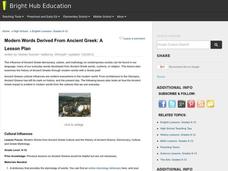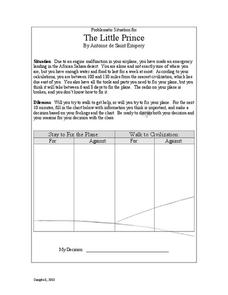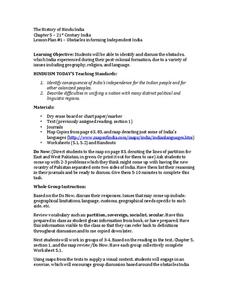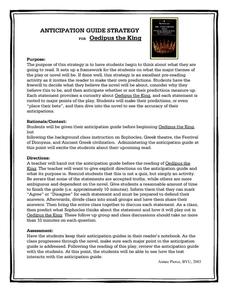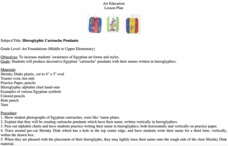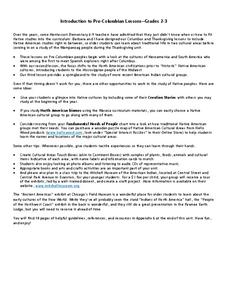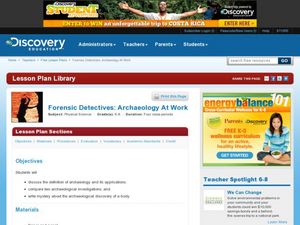Smarter Balanced
Aztec Empire
To set the stage for a study of the Aztec Empire, groups use the provided definition of civilization and generate a list of elements that make up our modern day civilization. The whole class then examines an image of an Aztec city and...
Polk Bros Foundation
Assess with Charts: Compare and Contrast
If you're short on time and need a quick graphic organizer to help your learners connect history to the present, check out this resource. This worksheet can be useful for a visit to a museum or in conjunction with a reading assignment,...
Curated OER
The Achievements and Challenges of Egypt
Awesome, that is all I have to say! This set of lessons provides learners with an understanding of ancient Egyptian laws, lifestyle, religion, and culture. It engages them in a critical analysis activity regarding the film, "The Prince...
Curated OER
Ancient Greece
Students explore the origins of modern language. In this etymology lesson, students discuss the cultural influences of Ancient Greece on modern society. Students design and complete charts that demonstrate the original and contemporary...
Curated OER
The Little Prince: Problematic Situation
Your plane has crashed in the Sahara desert. What do you do? Explore the possibilities with a role-playing activity based on Antoine de Saint Éxupery's The Little Prince. In groups, kids decide whether they would walk to find help...
Curated OER
Mythological Word Origins
Review myths and the characters therein, connecting them to vocabulary words in the English language today. Begin by searching online for myths and character names. With at least ten names that are familiar English words, students use...
Kauai's Hindu Monastery
The History of Hindu India
What obstacles did India face during their post-colonial formation after gaining independence? Topics discussed in the lesson include Pakistan's conflict over Kashmir, the Indian Constitution, economic development, and the...
Curated OER
It's Alive! Using Microorganisms in Cooking
Learners create a KWL chart about food. In this chemistry instructional activity, students differentiate physical and chemical changes. They explain how microorganisms are used in food preparation.
Chicago Botanic Garden
Unit 4 Pre-Assessment
Pre-assessments are great to help teachers determine what information their classes lack, what misconceptions they have, and how in depth to teach specific concepts. The first in a five-part series is a pre-assessment of middle...
Novelinks
Oedipus the King: Anticipation Guide
Is it possible to escape fate? Are all types of pride evil? Are family secrets best kept secret? Before reading Oedipus the King, class members respond to a series of statements on an anticipation guide that introduces some of the basic...
Curated OER
Hieroglyphic Cartouche Pendants
In ancient Egypt, mummified bodies were embellished with elaborate cartouches housing the name of the deceased. Elementary artists can read all about Egyptian burial practices then create a cartouche of their own using clay and real...
Curated OER
Greek and Roman Gods and Goddesses
In this ancient history worksheet, students identify the various Greek and Roman gods and goddesses. They complete a chart identifying whether they were Greek or Roman and what their specific area of interest was. Finally, students...
Curated OER
Toward Civilization
High schoolers are asked to define the term civilization. They work in small groups, each group is given the option of researching either the Neanderthal civilization or that of ancient Egypt. Students apply their definition to two...
Curated OER
Wheel of Pharaoh
Students investigate ancient Egyptian civilization and its rulers. For this ancient history lesson, students simulate playing a game similar to Wheel of Fortune whereby students have to correctly guess all the letters that spell a word...
Curated OER
Cleopatra
Students investigate the significance of notable women in history. In this ancient civilizations lesson, students debate the importance of Cleopatra and other notable women after they conduct research about the women.
Midwest Institute for Native American Studies
Introduction to Pre-Columbian Lessons
Native peoples established civilizations all over Central and North America. Introduce native civilizations with a unit that promotes discussion, reinforces map skills, enhances reading comprehension, and exposes young historians to...
Curated OER
Forensic Detectives: Archaeology at Work
Dig in! Middle schoolers learn about archaeology by exploring the remnants of the Chiribaya bodies found in Illinois. Compare archaeological investigations, and then write a mystery detailing the discovery of a body! Consider bringing in...
Curated OER
Energy Through the Ages
In this energy through the ages activity, students read about the history of energy use beginning with early civilization and the use of water wheels for the production of energy to hydrocarbon-based coal, oil and natural gas of today....
Curated OER
Scavenger Hunt for Ancient Egypt
Seventh graders do a scavenger hunt in order to investigate Ancient Egypt.
Curated OER
How Does Climate Influence Civilization
Young scholars demonstrate their knowledge of the Earth's systems. In this climate instructional activity students identify the climate of a chosen area and the effects it has on the lifestyles of those living there.
Curated OER
Geometry in the Heavens
Ninth graders access a star worksheet and determine properties of polygons. In this investigative lesson students complete a worksheet and discuss myths.
Curated OER
Ancient Story Problems
Pupils research ancient civilizations, and develop story problems using symbols and coins from those times. They retell these story problems using modern terms and coins.
Curated OER
Primary History Romans Extension Activity: The Roman Army
In this primary history worksheet, students sharpen their research skills as they study the ancient Roman army. Students select 1, 2, 3, or 4 extension projects to complete.
Curated OER
Pharaoh Phonetics
Students explore ancient Egypt. In this Egypt lesson, students use the Internet to research ancient Egypt and then participate in several activities that help them better understand Egyptian culture.





